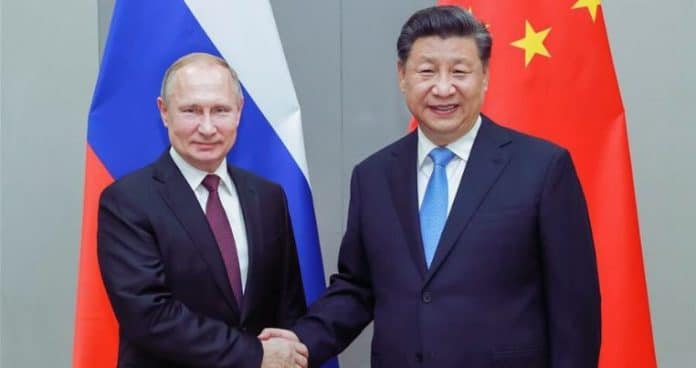China and Russia have recently signed several economic deals to strengthen their ties and cooperation, especially in the fields of energy, trade, and technology. Despite heavy criticism from the US, Russian Prime Minister Mikhail Mishustin met with Chinese Prime Minister Li Qiang and President Xi Jinping to sign a set of agreements.
The deals come amid rising tensions between the US and these 2 countries. The US has imposed sanctions on Russia over its involvement in Ukraine and criticized China over its human rights record and regional ambitions. It has raised concerns over Russia-China economic deals amidst the war in Ukraine.
What Do Russia-China Economic Deals Mean?
The main reason for such agreements is the strengthening of bilateral ties between the US’s two fiercest competitors. Russia is leaning on China for support due to the war in Ukraine and the increasing pressure from Western sanctions. Russia sees China as a crucial economic partner, particularly in terms of Chinese demand for Russian oil and gas. The economic deals, including agreements on investment cooperation, agricultural product exports, and sports cooperation, indicate the strengthening of economic ties between the two countries.
The second major deal encompasses the increase in energy trade between Russia and China. Russia’s energy shipments to China will reportedly rise by 40% this year. This expansion of energy trade reflects the growing economic interdependence between Russia and China. It provides Russia with a vital market for its energy resources while meeting China’s increasing energy demands.
Moreover, the two countries agreed on the supply of technological equipment to Russia. This aspect demonstrates China’s willingness to engage in technology cooperation and potentially invest in Russia’s technological advancements. It also signifies China’s growing influence in areas beyond energy cooperation.
What is China’s Stance on the War in Ukraine?
China has officially declared itself as neutral and called for a peaceful resolution of the conflict through dialogue and diplomacy. On the other hand, it has expressed respect for Ukraine’s sovereignty and territorial integrity, while acknowledging Russia’s legitimate security concerns and opposing unilateral sanctions by the US and its allies.
China has proposed a Global Security Initiative (GSI) that outlines its vision for a new world order based on mutual respect, cooperation, and non-interference. The GSI also includes a four-point plan for settling the Ukraine crisis, which involves implementing the Minsk agreements, restoring dialogue between Russia and the West, promoting economic development in Ukraine, and enhancing regional security cooperation.
China has claimed to deepen its ties with both Russia and Ukraine, as well as other countries in the region, through economic, energy, and cultural exchanges. China has also supported multilateral platforms such as the Normandy format and the UN Security Council to facilitate dialogue and coordination on the issue.
China’s stance is driven by a combination of strategic, economic, and ideological interests. Strategically, it wants to avoid a direct confrontation with either Russia or the US, while maintaining a balance of power in Eurasia. Economically, China benefits from trade and investment with both sides of the conflict, as well as access to energy resources and markets. Ideologically, China opposes any interference in the internal affairs of other countries, especially by Western powers.
Concerns for the US
The US is likely bothered by the deepening economic ties between Russia and China for several reasons. The main reason could be the geopolitical shift followed by the strengthening of economic cooperation between Russia and China. It will certainly challenge the dominant position of the US on the global stage. It has the potential to reshape the geopolitical landscape and create a counterbalance to American influence.
Additionally, the increasing energy trade between Russia and China diminishes the influence of the US in the global energy market. It diversifies China’s energy sources and reduces its reliance on American suppliers. Some analysts see the deals as a challenge to the US dollar’s dominance in global trade and finance, as China and Russia seek to reduce their reliance on the greenback and promote their own currencies. However, others argue that the dollar’s role is unlikely to be threatened by the yuan or any other currency, as it enjoys a strong network effect, institutional trust, and financial stability.
As Russia faces Western sanctions, China’s active economic engagement with Russia provides an avenue for Russia to circumvent the impact of these sanctions. The US may be concerned that China’s involvement could undermine the effectiveness of the imposed measures. The growing friendship between Russia and China raises concerns about their joint actions on international issues, including their stance on conflicts like Ukraine. The US may perceive this alignment as a challenge to its global objectives and influence.
Moreover, the potential supply of technological equipment to Russia by China signifies the advancement of their technological cooperation. The US may worry about China assisting Russia’s technological advancements, as it could enhance Russia’s military capabilities and ultimately pose challenges to American technological dominance.
Also Read


